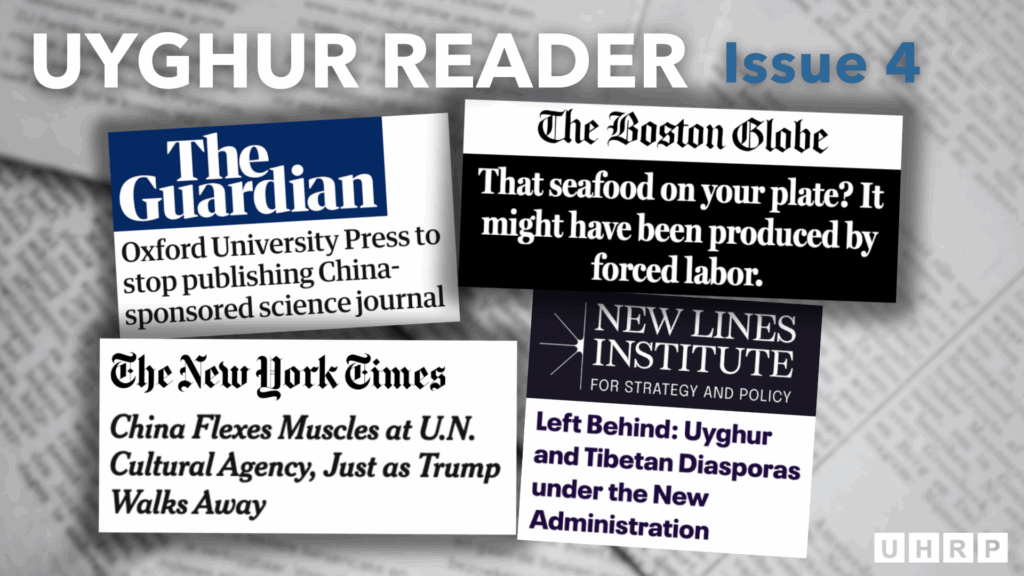The Uyghur Reader: Stories We’re Following (Issue 4)

Issue 4: July 10 – July 23, 2025
Welcome to the fourth issue of The Uyghur Reader, a biweekly content roundup curated by the staff of the Uyghur Human Rights Project.
Each issue features carefully selected articles, reports, and publications from media outlets, academic institutions, NGOs, and government sources. While we highlight urgent human rights issues, we also aim to reflect the breadth of the Uyghur experience, including politics, economics, history, and culture. Our goal is to provide a trusted resource for understanding the complexities and realities facing Uyghurs today.
This week’s selections come from Chinese Outreach Coordinator Zubayra Shamseden, Associate Director for Research and Advocacy Peter Irwin, and Director of Research Henryk Szadziewski.
📌 Mara Hvistendahl reported on July 23 for The New York Times on China’s increasingly aggressive push for influence at UNESCO, just as the US government has announced its decision to withdraw its membership. The piece describes how the Chinese government has targeted the UN body with an influence campaign to “increase its reach over educational curriculums, historical designations and even artificial intelligence,” as well as how UNESCO has lent support to major Chinese government priorities including the Belt and Road Initiative. Hvistendahl also highlights the Uyghur scholar, Abduweli Ayup, whose invitation to speak at a UNESCO event in Paris in February was rescinded. According to three members of the conference’s academic committee, UNESCO staff members feared offending the executives of the Chinese language learning company Talkmate, which was a major sponsor of the event. “China Flexes Muscles at U.N. Cultural Agency, Just as Trump Walks Away,” July 23.
📌 On July 22, New Lines Institute for Strategy and Policy hosted a panel of experts to examine the experiences of Tibetan and Uyghur diasporas under the Trump administration. Featured speakers included Ajinur Setiwaldi, JD, and Dr. Tsewang Rigzin, with Professor Eric Schluessel serving as moderator. The panelists explored how shifts in US policy have impacted the struggle for justice and visibility, including increasing uncertainty in the funding landscape.
📌 Shaun O’Dwyer, at Kyushu University, weighs in on the controversial visit to East Turkistan by representatives of Princeton University Press (PUP). In The Diplomat, he writes that the trip exemplifies how Chinese authorities leverage Western academia’s openness and market ambitions to whitewash atrocity crimes, adding “The tour footage thus feeds suspicions that PUP’s investment in the Chinese publishing market is weakening its commitment to free cultural and intellectual exchange.” “Princeton University Press Stumbles Into a Xinjiang Tour Debacle,” July 21.
📌 Levi Bridges joins a Uyghur wedding in Kazakhstan and reports on the cultural and religious revival in the Kazakh capital of Almaty. Listen to “Uyghurs in Kazakhstan practice Islam freely, not far from China,” The World from PRX, July 21.
📌 In a July 19 opinion article for The Boston Globe, Marcella Boehler draws on reporting from the Outlaw Ocean Project to expose the role of Uyghur forced labor in China’s seafood export industry. Boehler highlights how thousands of Uyghurs have been transferred under coercive state programs to factories in Shandong Province that export to the U.S., Canada, and Europe. Despite passing social audits, these factories rely on a labor system marked by surveillance and control. The piece calls for deeper scrutiny of seafood supply chains and greater accountability from companies and governments complicit in this hidden system of exploitation. “That seafood on your plate? It might have been produced by forced labor,” July 19.
📌 Amy Hawkins at The Guardian writes how Oxford University Press (OUP) will stop publishing Forensic Sciences Research (FSR), a journal linked to China’s Ministry of Justice. This follows concerns over the ethical use of genetic data—particularly involving Uyghurs. Uyghurs involved in studies published by FSR may not have given their DNA samples voluntarily, and the research could contribute to strengthening mass surveillance. Yves Moreau, a professor at the University of Leuven in Belgium, who first raised the issues with FSR, welcomed the decision. However, he added the move “fails to address the important issues at stake,” given that widespread surveillance of Uyghurs and Tibetans makes it especially difficult to uphold international standards on ethical research in China. “Oxford University Press to stop publishing China-sponsored science journal,” July 16.
Keep reading:
- Joshua Nevett, BBC, July 20: ‘Great British Energy solar panels’ were made in China
- Tahir Imin Uyghurian, Uyghur Times, July 19: Praying Under Oppression: Turkish Tourist Exposes China’s Crackdown on Urumqi Mosques
- Uyghur Times, July 16: Uyghur Man Legally Residing in Turkey Deported to Saudi Arabia After Airport Detention
- Reza Hasmath, The Conversation, July 10: How China’s green transition is reshaping ethnic minority communities
- Kharon, July 9: How China’s ‘Car Valley’ Injects UFLPA Risks into Global Supply Chains
